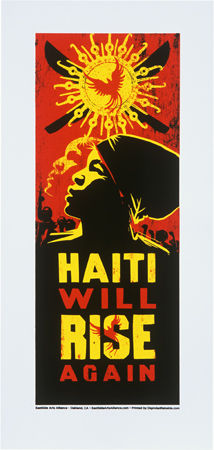
Haiti Will Rise Again
Jesus Barraza
Dignidad Rebelde
Eastside Arts Alliance
Silkscreen, 2010
Oakland, CA
32526
Last week, Donald Trump and JD Vance amplified racist, false, and highly inflammatory rumors that Haitian migrants in Springfield, Ohio were eating people’s pets and causing an increase in HIV infections. The flagrant rhetoric has resulted in over 30 bomb threats made on schools, government buildings, and homes. This type of outrageous and intentionally incendiary lies is correctly being compared in numerous corporate media to Nazi propaganda techniques. Trump and Vance also ignore the fact that the Haitians have lifted the local economy and are valuable workers in Springfield’s businesses.
This stoking of anti-Black, xenophobic sentiment is not new, and U.S. abuse of Haitians dates back centuries.
In 1804, the brutally enslaved Haitian people revolted against their French colonial oppressors and became the first post-colonial Black nation. However, despite earning independence, Haiti has been punished relentlessly for this rebellion in the centuries since. The newly independent U.S. refused to recognize Haiti until 1862, and France forced Haiti to pay a debt of 150 million francs ($21 billion today). Haiti was paying this debt until 1947.
From 1915 to 1934, the U.S. invaded and occupied Haiti, controlling taxation, the government, labor, and the sale of land. Haitians again revolted against this oppression but were massacred in response. In 1937, 30,000 Haitians living in the border zone were murdered by the Dominican Republic’s U.S.-backed dictator, Rafael Trujillo. During the Cold War, the U.S.-supported dictator Francois Duvalier, and his son and successor, Jean-Claude Duvalier, cumulatively tortured, killed, or disappeared between 30,000-60,000 Haitians.
The globalization of trade and “development” programs in the 1980s and 1990s exacerbated Haiti’s economic dependency and resulted in even more debt and a lowered standard of living.
In 1990, Haitians democratically elected Jean-Bertrand Aristide, a former priest, with a two-thirds majority. One year later, he was overthrown by a George H.W. Bush CIA-supported military coup. In 1994, Bill Clinton supported UN intervention to reinstate Aristide, but during George W. Bush's first term in office, the U.S. again funded anti-Aristide paramilitary groups. In 2004, U.S. soldiers kidnapped him and forced him to leave the country. Bush then sent in U.S. troops to "stabilize" Haiti.
In 2004 and 2008, catastrophic floods and hurricanes repeatedly demolished Haiti’s infrastructure and economy, leaving over 250,000 people homeless. In 2010, a catastrophic earthquake devastated Haiti, killing over 200,000 and displacing over 1 million. A cholera epidemic killed approximately 10,000. CSPG’s Poster of the Week was one of many produced to raise funds–but international efforts were not enough, and the country experienced yet another series of violent elections. Six years later, Hurricane Matthew destroyed crops, exacerbated the cholera epidemic, and left 250,000 families homeless.
With centuries of cruel debt, occupation, U.S.-backed political instability and violence, and now climate catastrophe, is it any wonder that thousands of Haitians have been fleeing the country? Like any migrants, especially those experiencing forced displacement, Haitians deserve safety, respect, and reparative justice for the multifold harms they have suffered. Not dehumanizing, dangerous rumors.
Resources:
Resources to Learn More and Support Haiti:

Comments